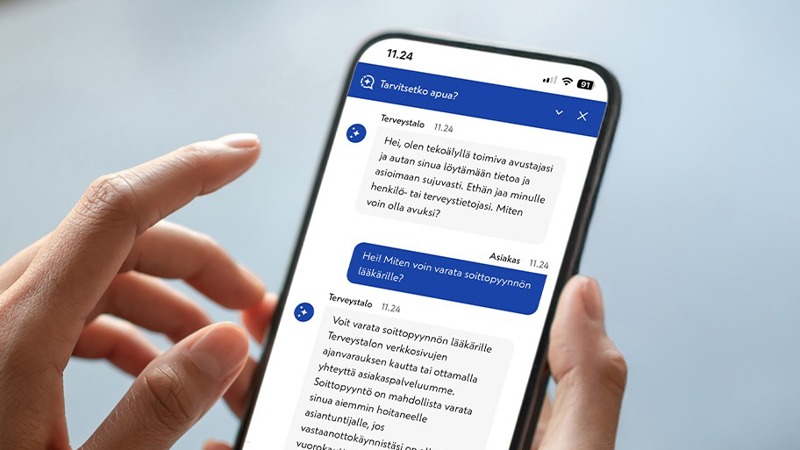Where did our attention go and how can we get it back?
We live in an era of overachievement and stimuli, which affects our ability to maintain attention, says Joakim Harju, a psychiatric nurse and paramedic at Terveystalo.

Attention means the ability to focus on a single task and filter out distractions from the environment.
− Attention is crucial for learning, working, relationships, and managing everyday life. Problems with attention manifest as forgetfulness, tardiness, and inability to concentrate on tasks or, for example, conversations, describes Joakim Harju, a psychiatric nurse at Terveystalo.
Technology has shortened attention spans and reshaped our brain's reward system The use of phones, televisions, and computers has become a significant part of our lives.
− We don't even really notice how much time we spend looking at different screens in a day. Excessive screen time, especially before going to bed, disrupts sleep patterns and affects the ability to focus, Harju explains.
The fast pace of modern life, with its social media clips, updates, and messages, has also shortened attention spans and increased susceptibility to distractions.
− We have become quite accustomed to receiving information and entertainment in very quick, small doses. This provides our brains with immediate gratification, which rewires our brain's reward system. Over time, our ability to maintain attention on tasks that are not immediately rewarding diminishes.
The endless stream of content makes focusing challenging: "Never in human history has there been a similar situation"
− Today, we have access to an unprecedented amount of information and distractions through the internet and social media. However, constant exposure to notifications and an endless stream of content makes focusing challenging.
Harju notes that there has never been a similar situation in human history.
− The amount of new content on various channels is so vast that our ability to adapt to the situation is being tested. Information overload strains our cognitive capacity and can cause anxiety, frustration, and an inability to filter out the necessary information from the content flood, Harju describes.
A culture focused on performance does not support our way of maintaining attention
According to Harju, a culture that values constant productivity and performance does not leave enough time for recovery, which is essential for mental health and concentration.
− People also try to perform multiple tasks simultaneously, thinking they are more efficient. In reality, multitasking weakens concentration and job performance. Multiple simultaneous goals and tasks do not support our natural way of maintaining attention and completing tasks.
How can we get our attention back?
Harju lists many proven effective ways to improve attention.
- Do one thing at a time.
- Minimize distractions, such as phone notifications.
- Ensure adequate dopamine, the pleasure hormone. Exercise, sufficient sleep, a healthy diet, and exposure to sunlight boost dopamine levels, which are needed to maintain motivation and, consequently, attention.
- Try mindfulness and body awareness exercises. Meditation and relaxation exercises can enhance brain function and concentration.
- Divide tasks into limited and small parts. This makes the task easier to approach, manage, and complete. It also maintains motivation.
- Set a deadline or reward for tedious tasks requiring concentration or perseverance. For example, give yourself an hour to complete a specific task: this makes task completion a kind of race against time. You can also reward yourself after completing the task.
- Do important things first thing in the morning. Many may notice that resistance to doing demanding tasks is lower right after waking up, making it easier to concentrate and get things done before the day's information flood and demands take their toll.
Attention problems due to our living environment have increased alongside ADHD
According to Harju, many people today have a distorted view of what attention should be.
− It is quite normal not to be able to concentrate on one thing for hours, to find it difficult to start an unpleasant task, or for thoughts to wander at times.
Today, there is much talk in the media and social media about the increase in ADHD, which has made many people worried about attention challenges. ADHD, or attention deficit hyperactivity disorder, is a congenital neurological disorder, and its diagnosis is crucially based on the presence of symptoms throughout life from childhood onwards.
Lue lisää aiheesta

What is metabolic age and why should you care about it?
A new laboratory study by Terveystalo reveals how your body is aging. Metabolic age makes biological aging visible.

Smooth assistance for your needs – our AI assistant is now at your service
You can now find Terveystalo’s AI assistant on our website — a quick and easy way to get answers based on the information available on our site. For now, the assistant is available only on the Finnish‑language section of our website, but you can chat with it in English.

How technology helps relieve mental stress: "When the load is high, the threshold must be low."
Mental health disorders have overtaken musculoskeletal disorders, which had long been the leading cause of sick leave. Work is changing, and the range of sick leave caused by mental health issues has also changed. We must be able to offer new solutions to this challenge.

Extensive data set of 200,000 samples: Nightingale study reveals link between illness risks and sick leave
Data from the Finnish Nightingale study, which is used in Terveystalo's occupational health services, reveals a clear link between lifestyle-related health risks and sick leave. The exceptionally extensive data set of over 200,000 customers shows that people with a low risk of illness had significantly fewer absences, while those in high-risk groups had more absences. The results highlight the importance of preventive healthcare in ensuring work ability and the competitiveness of companies.

Strong identification speeds up your service experience when calling us
Soon you can identify yourself easily and securely before your call is answered. Read below to see how the identification process works.

Terveystalo's digital services have been awarded the internationally recognized ISO27001 information security certification.
Terveystalo's information security practices, processes, and risk management are in line with international best practices.